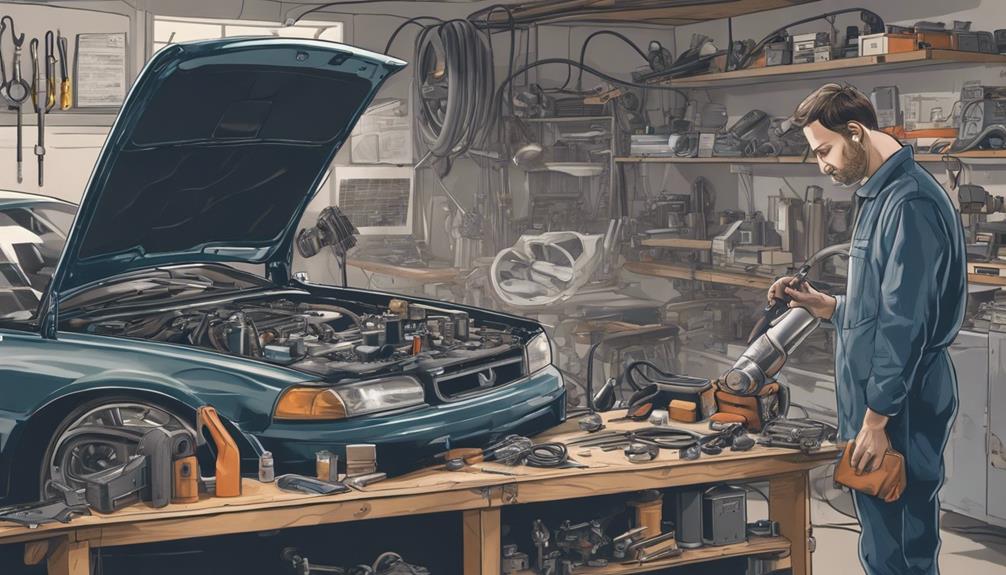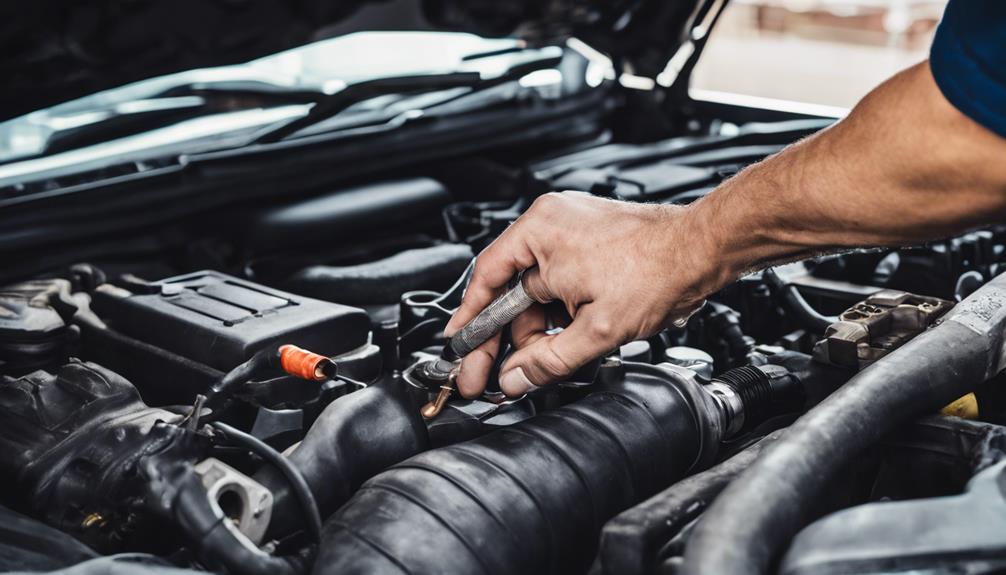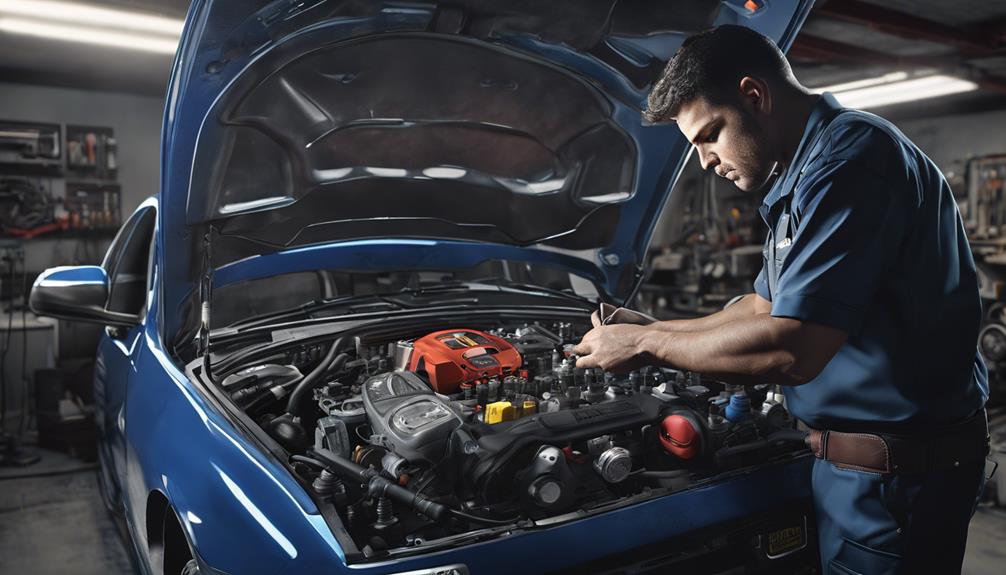In the realm of engine repairs and diagnostics in McAllen, TX, the intricate dance between technology and expertise is crucial. As vehicles become more advanced, the need for accurate and efficient diagnostic services grows ever more pressing. Imagine the peace of mind that comes with a thorough engine check-up, uncovering hidden issues before they escalate. But how does one navigate this complex world of engine maintenance with confidence and assurance? Find out how seasoned professionals at D & D Wheel Aligning in McAllen are revolutionizing the way engine repairs and diagnostics are handled, ensuring optimal performance and reliability for your vehicle.
Key Takeaways
- Timely diagnostics in McAllen T are vital for identifying engine issues promptly.
- Addressing warning signs in McAllen T prevents costly repairs and preserves peak performance.
- Professional diagnostics in McAllen T ensure efficient issue resolution for optimal functionality.
- Regular maintenance in McAllen T, including tune-ups, enhances engine longevity and minimizes problems.
Importance of Timely Engine Diagnostics
In the realm of automotive maintenance, timely engine diagnostics play a pivotal role in identifying potential issues before they escalate into significant problems. Engine diagnostics are crucial for ensuring the optimal performance of a vehicle. By utilizing diagnostic services, individuals can pinpoint engine problems early on, allowing for suggested repairs and maintenance to be carried out promptly. Regular engine diagnostics are essential for preserving peak engine performance and preventing costly repairs down the line. Ignoring warning signs can result in further damage, underscoring the importance of timely engine diagnostics to maintain the overall health of the vehicle. Professional repair services often rely on comprehensive engine diagnostics to address issues efficiently and effectively, ensuring that the vehicle operates at its best.
Signs of Engine Trouble to Watch For
When warning lights start blinking on the dashboard or unusual engine noises become noticeable, it’s crucial to pay attention to these signs of potential engine trouble. These early indicators can help diagnose issues like malfunctioning sensors, misfiring cylinders, or worn-out components that require immediate attention to prevent further damage. By promptly addressing warning signals and unusual engine behavior, vehicle owners can avoid costly repairs and ensure optimal engine performance.
Warning Lights Blinking
Blinking warning lights on the dashboard serve as crucial indicators of potential engine issues that demand immediate attention. When these lights illuminate, it’s essential to address the underlying problems promptly to prevent further damage. Here are key points to consider:
- Check Engine Light: Signals various engine malfunctions, requiring thorough diagnostics.
- Low Oil Pressure Warning: Indicates a potential oil leak or inadequate lubrication.
- Overheating Alert: Warns of engine overheating, necessitating cooling system inspection.
- Faulty Sensor Indication: Alerts to possible sensor failures affecting engine performance.
Responding promptly to these warning lights by seeking professional engine diagnostics can prevent costly repairs and ensure optimal engine functionality.
Strange Engine Noises
Listening attentively to your vehicle’s engine can unveil crucial signs of potential trouble, especially through the identification of strange noises. Strange engine noises like knocking, pinging, or grinding can indicate underlying issues that require immediate attention from a professional mechanic. It is essential to pay attention to any sudden changes in engine noise, such as loud clunking or high-pitched squealing, as they could signify serious problems that need to be addressed promptly. Ignoring these unusual sounds can lead to further damage and more expensive repairs in the future. Consulting a knowledgeable mechanic for diagnosis and repair when encountering unfamiliar or concerning engine noises is key to maintaining the health and performance of your vehicle.
| Engine Noise | Description | Action Needed |
|---|---|---|
| Knocking | Metal-on-metal sound | Professional inspection required |
| Pinging | High-pitched rattling | Immediate attention advised |
| Grinding | Abrasive, rough noise | Urgent repair needed |
Common Engine Repair Techniques

One crucial engine repair technique involves replacing worn-out spark plugs to ensure proper ignition and performance. When it comes to common engine repair techniques, mechanics often address various components to maintain the engine’s health and efficiency. Some key techniques include:
- Cleaning or replacing clogged fuel filters: This helps maintain fuel efficiency and ensures proper engine function.
- Addressing cooling system issues: Resolving problems like coolant leaks or radiator issues is essential for preventing overheating.
- Repairing or replacing faulty sensors: Issues with sensors like the oxygen sensor can impact engine performance.
- Conducting a compression test: This diagnostic technique assesses the health of cylinders and pistons to identify potential engine issues promptly.
Benefits of Regular Engine Maintenance
Regular engine maintenance is essential for ensuring peak performance and longevity of the vehicle. Consistent upkeep helps to prevent unexpected breakdowns and costly repairs. Here are some key benefits of regular engine maintenance:
| Benefits of Regular Engine Maintenance | |
|---|---|
| 1. Improved Performance | Regular maintenance keeps the engine running smoothly, optimizing fuel efficiency and power. |
| 2. Enhanced Safety | Timely inspections can identify potential issues before they become hazardous, reducing the risk of accidents. |
| 3. Extended Lifespan | Proper maintenance can prolong the life of the engine, saving you money on major repairs or replacements. |
Understanding Engine Warning Lights

Engine warning lights serve as crucial indicators of potential engine issues, each light conveying specific information about the vehicle’s health. Understanding the meanings behind these warning signals is essential for prompt and effective maintenance. Modern diagnostic tools are invaluable in deciphering the codes emitted by these warning lights, aiding in the accurate identification and resolution of underlying problems.
Warning Light Meanings
Understanding the meanings of warning lights in vehicles is crucial for prompt identification and resolution of potential engine issues. When a warning light illuminates on your dashboard, it is essential to decode its message accurately to address any underlying problems effectively. Here are four common warning lights and their meanings:
- Check Engine Light: Indicates issues with the engine or emissions system that require attention.
- Oil Pressure Light: Warns of low oil pressure, signaling a potential lack of lubrication in the engine.
- Battery Light: Signals a problem with the charging system or a failing battery.
- Coolant Temperature Light: Alerts to high engine temperature, suggesting a cooling system malfunction.
Understanding these warning lights can help prevent further damage to your vehicle and ensure its optimal performance.
Common Warning Signals
When warning lights illuminate on a vehicle’s dashboard, immediate attention is crucial for diagnosing potential engine issues and preventing further damage. Understanding common warning signals can help drivers address problems promptly. Here are some key warning signs that indicate possible engine trouble:
| Warning Signals | Description | Action Needed |
|---|---|---|
| Check Engine Light | Indicates issues with the engine system | Diagnostic check |
| Service Engine Soon | Warns of potential engine or emissions issues | Immediate inspection |
| Oil Pressure Light | Alerts to low oil pressure in the engine | Check oil levels |
| Strange Noises | Unusual sounds like knocking or grinding | Professional evaluation |
| Rough Idling | Engine runs unevenly at idle | Check for engine issues |
Promptly addressing these warning signals can prevent costly repairs and keep the engine running smoothly.
Diagnostic Tools Available
Using advanced diagnostic tools such as OBD-II scanners can accurately interpret engine trouble codes, aiding in the precise identification of underlying issues. The OBD system plays a crucial role in understanding engine warning lights, helping technicians diagnose issues like misfires or sensor malfunctions effectively. Different warning lights signify various system malfunctions, guiding mechanics in their diagnostic procedures. Engine diagnostics offer real-time insights into engine performance, emissions, and overall health. Comprehensive diagnostic tools equipped with the OBD system are instrumental in detecting complex engine problems, allowing for accurate and efficient repairs.
- OBD-II scanners interpret engine trouble codes precisely.
- Engine warning lights assist in identifying specific problems like misfires.
- Different warning lights indicate various system malfunctions for guidance.
- Engine diagnostics provide real-time data on engine performance, emissions, and health.
DIY Vs. Professional Engine Diagnostics

Opting for professional engine diagnostics ensures accurate assessment and reliable results for optimal performance. While DIY diagnostics can save money, they may lack the precision of professional tools and expertise, potentially leading to misdiagnosis and damage if not executed correctly. Professional diagnostics utilize specialized equipment to pinpoint issues accurately, providing detailed reports and repair recommendations. The table below highlights the key differences between DIY and professional engine diagnostics:
| Aspect | DIY Diagnostics | Professional Diagnostics |
|---|---|---|
| Equipment | Basic tools and OBD-II scanners | Specialized tools and diagnostic equipment |
| Precision | May lack accuracy due to limited tools and knowledge | Offers precise assessment for accurate results |
| Risk of Damage | Higher risk if not done correctly | Minimizes risk of misdiagnosis and damage |
| Expertise Required | Relies on individual knowledge and experience | Utilizes trained professionals for accurate diagnosis |
Engine Performance Optimization Tips
Professional engine performance optimization tips encompass a range of strategies aimed at maximizing efficiency and longevity while minimizing potential issues. To enhance engine performance effectively, individuals can follow these tips:
- Regular Tune-Ups: Schedule periodic auto service appointments to inspect spark plugs, filters, and belts, ensuring optimal performance and fuel efficiency.
- Utilize Engine Diagnostics: Make use of advanced engine diagnostics to gain insights into the engine’s operating condition, enabling early detection of issues.
- Prioritize Maintenance: Regular maintenance is crucial to maintaining peak engine performance, preventing major problems and costly repairs.
- Address Warning Signs Promptly: Be alert for signs like slow cranking, rough idling, or decreased gas mileage, indicating the need for diagnostics and timely repairs.
Cost-Effective Engine Repair Solutions

Eagle Automotive in McAllen, TX, offers cost-effective solutions for engine repairs, ensuring reliable service and guaranteed work quality. Customers can benefit from the GEICO’s Auto Repair Xpress® program at Eagle Automotive, making car repair more convenient. Additionally, financing options are available through the Eagle Automotive Car Care One credit card, providing flexibility for auto shop services. With approved credit, customers can enjoy 6 months of no-interest financing for engine repair services, making it easier to maintain their vehicles. This commitment to affordability and quality sets Eagle Automotive apart as a trusted partner for car repair needs in the McAllen area.
| Cost-Effective Engine Repair Solutions | Benefits |
|---|---|
| GEICO’s Auto Repair Xpress® program | Convenient car repair |
| Eagle Automotive Car Care One credit card | Flexible financing options |
| 6 months of no-interest financing | Affordable engine repair |
Finding Reliable Mechanics in McAllen
When seeking reliable mechanics in McAllen, discerning customers prioritize experience and proven track records for quality service. Here are four essential factors to consider when looking for reputable McAllen auto repair service:
- Customer Reviews: Check online platforms and ask for recommendations to gauge customer satisfaction levels.
- Certifications: Look for mechanics with ASE (Automotive Service Excellence) certifications to ensure expertise.
- Warranty Offerings: Reliable mechanics often provide warranties on parts and labor for added peace of mind.
- Transparent Pricing: Opt for mechanics who offer clear, detailed estimates and explain the breakdown of costs upfront.
Frequently Asked Questions
Can Engine Diagnostics Be Performed Without Actually Physically Inspecting the Engine?
Remote diagnostics can be conducted without physically inspecting the engine through virtual inspections. This method involves using specialized software and tools to analyze the engine’s performance data remotely. By accessing the engine’s diagnostics systems, technicians can identify issues, monitor performance, and even make certain adjustments without being physically present. This approach allows for efficient troubleshooting and maintenance, saving time and resources for both the technicians and the clients.
How Often Should Engine Diagnostics Be Performed on a Vehicle?
Engine diagnostics should be performed regularly to maintain vehicle health. The frequency depends on factors like mileage, age, and driving conditions. Regular diagnostics offer insight into potential issues before they escalate, saving time and money. By detecting problems early, owners can prevent breakdowns and extend the lifespan of their engines. The benefits of diagnostics include improved performance and fuel efficiency. Therefore, regular maintenance, including frequent diagnostics, is crucial for vehicle longevity.
Are There Any Specific Engine Issues That Are More Common in Certain Makes and Models of Vehicles?
Common engine issues vary across specific vehicle models. Diagnostic methods, such as remote diagnostics, can pinpoint these issues early. Regular maintenance is key to preventing costly repairs. Aftermarket tools aid in efficient diagnostics. Misconceptions among car owners can lead to neglecting necessary checks. Understanding model-specific trends can help owners stay ahead of potential problems.
Are There Any Aftermarket Engine Diagnostic Tools or Software That Can Be Used by Car Owners?
While there are aftermarket engine diagnostic tools and software available for car owners to perform DIY diagnostics, their effectiveness may vary. Third-party tools can be useful for basic checks, yet they often have limitations compared to professional equipment. Car enthusiasts may find these tools beneficial for routine maintenance and preliminary assessments. However, for more complex issues, consulting a professional mechanic with specialized diagnostic tools is recommended for accurate and thorough evaluations.
What Are Some Common Misconceptions About Engine Diagnostics and Repairs That Car Owners Should Be Aware Of?
When it comes to engine diagnostics and repairs, car owners should be aware of common misconceptions. Some believe warning signs can be ignored, leading to costly repairs. DIY options may seem straightforward but can exacerbate issues if performed incorrectly. It’s crucial to understand that timely diagnostics can prevent major problems. Seeking professional help when needed is essential for accurate assessments and effective solutions. Being proactive and informed is key to maintaining a vehicle’s health.

No Responses